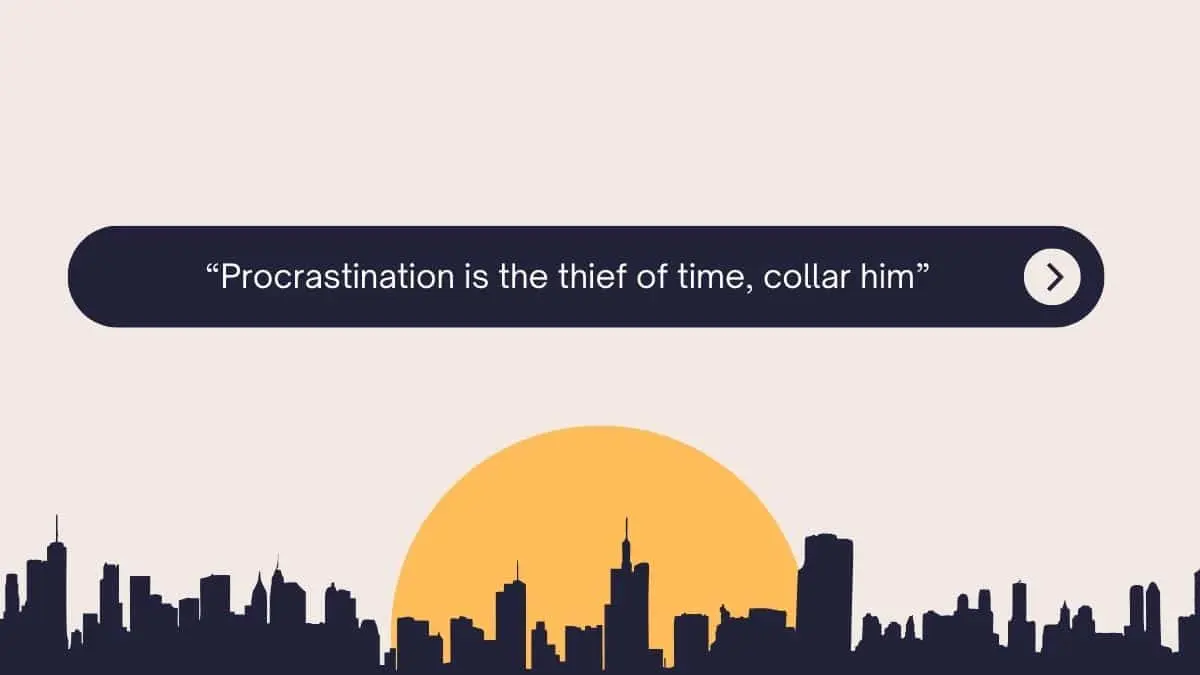“Procrastination is the thief of time, collar him.” This quote from Charles Dickens, the legendary author of works such as “Great Expectations” and “Oliver Twist,” offers us a profound insight into one of the biggest barriers to personal and professional growth—procrastination. Dickens presents procrastination as a cunning thief, stealing our most valuable resource: time. But he doesn’t stop there. The phrase “collar him” suggests that this isn’t just a lamentation; it’s a call to action. We have the capability and responsibility to ‘collar’ or catch this thief and reclaim our stolen time.
The Psychology Behind Procrastination
Before we can collar this “thief,” we need to understand its nature. Procrastination is often mistaken for laziness, but in reality, it’s far more complex. Many people procrastinate not because they don’t want to work but because they feel overwhelmed, anxious, or insecure about the task at hand. For some, the fear of failure is so paralyzing that it’s easier to put off the task altogether than to face the possibility of not meeting expectations. This creates a self-perpetuating cycle: the more you procrastinate, the more overwhelming the task becomes, making it even more tempting to procrastinate further.
Psychological studies suggest that procrastination is linked to emotional regulation. Tasks often trigger emotional responses—whether it’s anxiety, boredom, or doubt. The act of procrastinating serves as an emotional coping mechanism, helping to mitigate those feelings temporarily. However, the relief is short-lived. Procrastination only deepens the emotional quagmire by introducing guilt, stress, and additional anxiety as deadlines loom closer.
The Cost of Procrastination
Time is an irreplaceable resource. Once lost, it cannot be regained. Procrastination eats into our time, affecting not just the task at hand but also creating a ripple effect on our overall productivity. It leads to cramming, all-nighters, and hastily done work that rarely reflects our true capabilities. But the costs go beyond compromised quality and tight deadlines; procrastination affects mental health, professional development, and personal growth.
The stress and anxiety caused by repeated procrastination can lead to chronic mental health issues, including depression and burnout. Professionally, the habit can hold you back from achieving your full potential. Opportunities for growth, promotion, or even simple recognition may be squandered simply because we can’t find the courage or discipline to tackle tasks in a timely manner.

Practical Steps to “Collar” Procrastination
So how do we collar this thief? Awareness and understanding are the first steps toward meaningful change. Recognize that procrastination is not a character flaw but a behavioral pattern—one that can be altered. Below are some actionable steps to help you ‘collar’ procrastination:
Prioritize Tasks
The Eisenhower Box, often referred to as the Urgent-Important Matrix, is a simple tool that can help prioritize tasks. It consists of a 2×2 grid with axes for urgency and importance. Place tasks in one of the four boxes: urgent and important, important but not urgent, urgent but not important, and neither. The objective is to focus more on important tasks that align with your goals and values, rather than being caught up in endless “urgent” tasks that contribute little to your overall progress.
Break It Down
Large projects can be overwhelming, and that feeling of being overwhelmed often fuels procrastination. Break tasks down into smaller, more manageable pieces. This makes it easier to tackle them one by one, creating a sense of progress and achievement that can further motivate you.
Use the Pomodoro Technique
The Pomodoro Technique is a time management method that encourages people to work with their time, rather than against it. Use a timer to break work into intervals—traditionally 25 minutes—separated by short breaks. These intervals are known as “pomodoros.” This method fosters intense focus and productivity while providing opportunities for rest and relaxation.
Eliminate Distractions
Creating a conducive work environment is crucial for overcoming procrastination. Remove distractions such as social media, extraneous tabs, and unnecessary apps from your workspace. Tools like website blockers can help keep you focused.
Implement the Two-Minute Rule
Popularized by productivity consultant David Allen, the two-minute rule suggests that if a task takes less than two minutes, do it immediately. Completing the task right away takes less time than having to get back to it later, and it also provides a small but immediate sense of accomplishment.
Be Accountable
Having someone to answer to can act as a strong deterrent to procrastination. Whether it’s a mentor, friend, or coworker, find someone who can hold you accountable for your tasks. Regular check-ins and progress reports can work wonders.
Conclusion
“Procrastination is the thief of time, collar him”—these words are as true today as they were when Charles Dickens first penned them. Procrastination is not just a bad habit but a barrier that can significantly impact various aspects of our lives. Yet, it is not an insurmountable obstacle. With self-awareness, effective strategies, and a dash of self-compassion, we can collar this thief and reclaim our precious time.
Also Read: Not all of us can do great things. But we can do small things with great love











